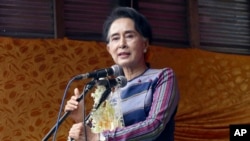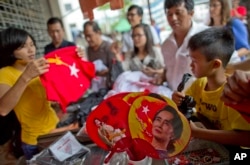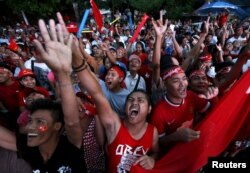Myanmar election winner Aung San Suu Kyi will not press for an immediate change to the constitution that bars her from becoming president, and will instead appoint a ceremonial head of state, a senior official in her party said Wednesday.
She will also include in the new cabinet at least one member of the military-linked Union Solidarity and Development Party (USDP), which was trounced in the November vote, as well as technocrats from ethnic minorities who have long complained of being sidelined from power.
The democracy champion is keen to avoid open confrontation with the powerful military, perhaps wary that the last time she triumphed at the ballot box in 1990, the army kept her under house arrest for years and refused to surrender power.
That does not mean Suu Kyi's National League for Democracy (NLD) party has given up on its overarching goal of amending the constitution, the party official told Reuters, but the issue has not been discussed yet between the sides in recent weeks.
"Our choice of president will be only ceremonial and the decisions will be made only by Aung San Suu Kyi," said the official, who declined to be named because of the sensitivity of negotiations on how the country will be run following the NLD's landslide election victory.
He reiterated Suu Kyi's assertion that she would stay "above the president."
But by appointing a figurehead president, the NLD aims to "show the people this ridiculous constitution must be amended."
Suu Kyi has discussed aspects of the transition with the army chief at "a few" previously unreported closed-door meetings since the elections, he said.
She has also appointed NLD liaisons who are in regular contact with the army, part of intensifying efforts to build trust between the party and its former enemies.
Last month Suu Kyi met the former head of the junta that ruled the country for 49 years, Than Shwe, pledging the NLD wanted to work for the "brighter future" and not focus on the past.
Pragmatism trumps past
The Nobel laureate's conciliatory steps toward the army reflect a pragmatic approach to transition from semi-civilian rule in place since 2011, and see Suu Kyi's image as a democracy icon blur with that of a political operator.
That pragmatism has drawn criticism in the recent past.
One issue Suu Kyi largely avoided during election campaigning, for example, was the plight of Myanmar's persecuted Rohingya Muslims, a silence that was frowned upon by some international observers.
As far as political transition is concerned, however, experts said the 70-year-old's willingness to do business with the former military dictatorship was unavoidable.
"Her priority ... is not to get rid of the military or to diminish it, but to bring it under civilian control, and I think that's understood by everyone to be a gradual process," said Richard Horsey, a respected Yangon-based analyst and former senior United Nations official in Myanmar.
"It's not going to happen overnight and it can only happen if the military accepts to be brought under civilian control, given ... its de facto authority and power," he said.
Myanmar's existing constitution, drawn up by the junta, guarantees the military a quarter of seats in parliament, control of three security ministries and a constitutional veto.
Rocking the boat
NLD representatives were meeting or calling army officers "two or three times" a week, the official said. Both mid- and high-ranking party members were involved in the talks.
"They [the military] are nervous. They want to know that we won't rock the boat," said the official.
Zaw Htay, a senior official in the president's office, supported the dialogue.
"Trust and cooperation are based on understanding. So both sides need to talk to each other directly without using a third person," he said.
Suu Kyi's new cabinet will be streamlined to include less than 25 ministries from 36 now, according to the NLD source.
Ministerial and presidential candidates, still under debate among top NLD leaders, will be announced just before the start of the new parliament on Feb. 1, he added.
The NLD does not plan to retain any ministers from the current administration due to political opposition, although the relative lack of experience in government among the NLD leadership is a cause for concern.
"We are worried that our people have little or no experience in actual governance," said the official.
The government will include at least one member of the USDP, a move welcomed by the office of President Thein Sein, who has led Myanmar since 2011 and introduced a series of reforms.
"It's a good thing," Zaw Htay said. "The NLD is the winner, but they do not want to take it all. It's a positive step for national reconciliation."







